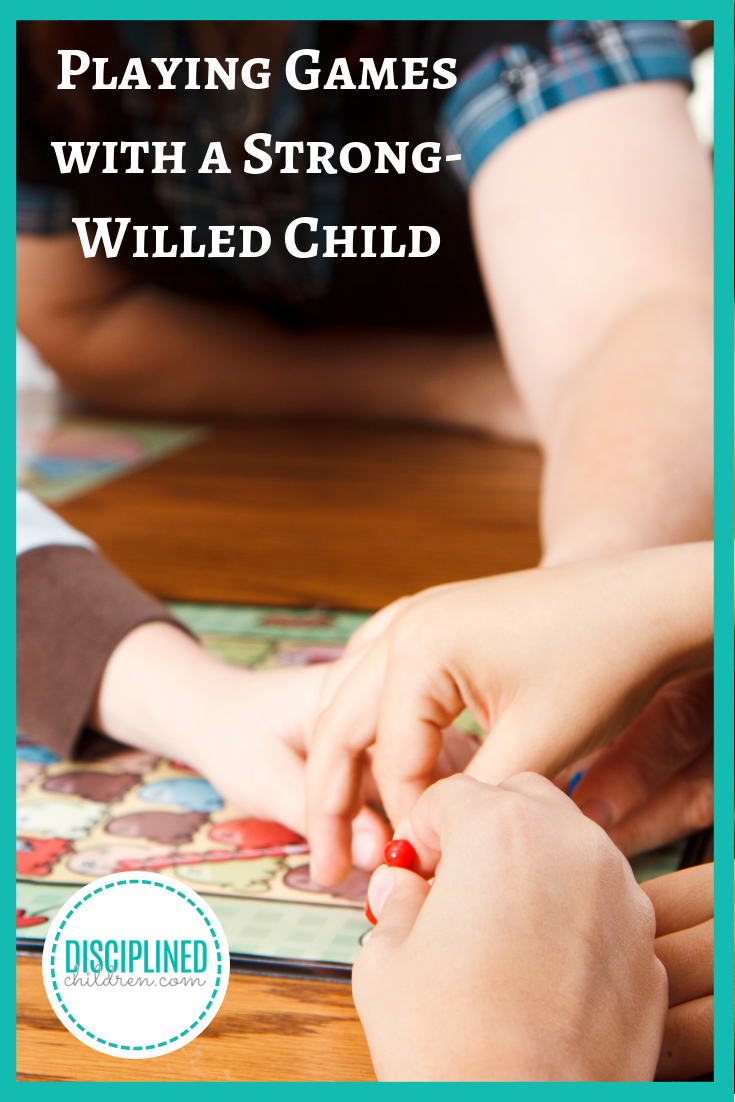Playing games with a strong-willed child?
“No thanks” is the polite version of how most parents want to respond to that question. The real version sounds more like, “No &%$#ing way!”
Playing games with a strong-willed child is not a fun time! No one enjoys it, not the adults who are appalled by the child’s lack of social skills nor the children who have zero fun playing with the unfair, self-focused, strong-willed child who really only seems to care if he’s enjoying himself and winning the game, as he expects to do every time he plays.
Your current coping mechanism may be to just avoid games altogether, but that’s not a long-term, feasible option, especially since ultimately he needs to learn how to handle winning and losing gracefully and playing a game by the rules. And unfortunately, without practice, this behavior is only going to get worse with age.
In my playroom, I use a 4-step system to help strong-willed kids learn how to play games without tantrums, arguments or game pieces flying through the room. I’m happy to share that with you today!
#1 More Games, Please!
The typical reaction that I hear from the adults who are sick and tired of the strong-willed child turning games into a fight, temper tantrum or a giant mess of scattered cards and game pieces is, “Well fine. If you can’t play nice, then we’re not going to play games at all.”
While I understand where this comes from—the idea that this is a natural consequence for his inappropriate gaming behavior—this attempted solution is actually causing him more harm than good.
The example that I use to help parents to understand why this isn’t valuable is that of learning how to ride a bike. If a child falls off his bike the first time he attempts to ride it, we tell him to get back on and try again. We remind him that he’ll fall time and time again but learning to ride the bike comes from his willingness to get back on and try it one more time.
Yet when he “falls off” while playing games, we take the bike away from him. We tell him that he didn’t do a good enough job and so he doesn’t get to practice.
And this does him no good!
So as difficult as playing games with a strong-willed child is, I encourage you to resist the temptation to take this practice away from him and (no matter how much it hurts or how miserable it makes you feel) bring the games back in full force so that he gets plenty of opportunity to learn the skills. He’ll get there, it just takes time.
#2 Clarify the Rules
In my practice, I always have to clarify the rules with kids. You’d be surprised to know that there are about a million ways to play the game UNO! I had no idea of this until I started playing with kids, individually and in groups, and found that arguments broke out over when and how someone can say UNO, what happens when a special card is laid down and even how we know that someone has won the game (this last one really blew my mind!).
While playing games with a strong-willed child, clarifying the rules is a must. I have to know what he thinks the rules are if I’m going to be able to play accordingly (and if I’m going to be able to intervene as necessary to teach him better game playing skills).
With strong-willed kids, clarifying the rules of a game is a must! Enjoy playing games again! #swc #parenting Share on X
So how do you clarify the rules? If your answer is to list off the rules for him, try again!
The best way to clarify the rules with a strong-willed child is to specifically ask him what the rules are. Engaging him in the conversation helps him to feel like he’s got some control and involvement (since kids are frequently used to hearing adults telling them exactly what to do and how to do it) and it will give you some necessary insight for your upcoming game play.
Depending on the game, you’ll need to ask questions about how we decide who goes first, what different actions in the game are needed and how we know when it’s time to do them, how to win the game and any other possible detail that could come up.
Think down to the nitty gritty and what special, random rules your creative strong-willed child might come up with in the process of playing the game. The more specific you get with this, the easier it’s going to be to intervene if he starts getting argumentative and selfish (but I’ll talk more about that in section 4).
As soon as you’ve clarified the rules very specifically, you can start playing the game.
#3 Narrate, Don’t Scold
If you’re used to playing games with a strong-willed child, you’ve likely gotten into a painfully repetitive pattern:
- He starts to play unfairly
- You correct him
- He pushes back, argues, maybe gets aggressive
- Naturally, you attempt to correct this again
- He reaches the point of no return, and
- Everyone leaves the game feeling like they had no fun and this was a complete waste of time (and maybe there’s a mess to clean up).
The parent-child dance above isn’t helpful—it never makes the situation better—yet every time the game comes out this is exactly what happens.
“Well, I have to correct him” a desperate mom will say to me. “If I don’t, he’ll think it’s OK” she’ll plead. My answer to that is typically, “Does he believe that it’s not OK after you correct him?” She typically says, “Well I don’t know…he’s never shown that he’s gotten anything from it!”
And she’s spot on when she says that! He’s not taking anything from your corrections and demands that he play fairly. One game to the next, he’s still playing unfairly, complaining whenever he doesn’t win and acting in ways that you really do not appreciate.
And that’s with you putting all of this effort in to trying to correct the behavior.
Instead of correcting, I suggest that you use The Narrator Technique to tell him what’s going on and to help him to draw connections between his actions and the game play, results, etc.
Examples
While pouting about getting the peppermint in Candy Land…
Correcting: Everyone has to move backward sometimes. If you can’t handle playing by the rules, then we can stop.
Narrating: You were way in the lead and then you got the peppermint. That put you back towards the beginning and you didn’t want to go back but knew you had to because that’s the rule.
When he catches back up to the other pawns in the game…
Correcting: See, you wasted all of that time crying and here you are, back with us again.
Narrating: You were way back at the peppermint and now you’re here near us again. You realize that there’s a chance you can still win even though you had to go back to the peppermint and work your way back up.
When the game is over and he wins…
Correcting: See, you were pouting for no reason. You won anyway. All of that crying and fussing was for nothing and just ruined the fun we could have had.
Narrator: Even though you got the peppermint, you still made it to the castle before everybody else. You thought that was going to take away your chances of winning, but that wasn’t true today!
When the game is over and he loses…
Correcting: Well you didn’t really deserve to win anyway, with all of that whining and fussing you did. I don’t even want to play anymore since you acted like that.
Narrating: You weren’t happy when you got the peppermint. You were close to catching back up to us but it just wasn’t quite enough during this round and your sister got to the castle first. Should we see if anyone else gets the peppermint in another round? [This last question is not part of The Narrator Technique]
If at any time during the game play, your child introduces a new rule to his benefit…allow it. I know, this sounds really weird, but I promise that it’ll be worth it in the end and will teach him a very valuable lesson. Simply let the rule be added and use The Narrator Technique to clarify both of your understanding of the rules. [I’ll address how to turn this into a lesson-learning opportunity in the next section]
What to do when your strong-willed child tries to cheat while playing games...#swc #parenting Share on X
#4 Reference the Rules Conversation
My favorite part of playing games with my strong-willed kids is when the universe is on my side and some special rule that the child has identified—either in the rule clarifying conversation or some random, selfish rule he made to his own benefit—comes up in my favor. I try to hide my glee as I begin to teach him a lesson about how to play fairly that he can’t possibly argue with (this is hard to do with a strong-willed child, but most will not argue if it’s handled correctly).
When this situation arises, this is what I do:
- Say, “I’m so glad we talked about this rule because now I know…” and finish that sentence to address what you’re about to do
- Make your move and wait for the child to answer/respond, and
- If the child does attempt to argue, use The Narrator Technique to discuss the disagremment between the two different situations (i.e. the initial rule conversation that indicated that this was OK and the resulting situation in which he’s identifying that it’s not OK because it’s benefitting you)
Here’s what this looks like in real-life:
Emily: I’m so glad we talked about this before we started the game because now I know that I can put a +2 card on your +2 card and now you have to draw 4 cards.
I place my card down and wait for him to draw his 4 cards. He usually will, unless he has a light bulb moment that tells him to argue, because this rule was only beneficial for him…
Aiden: Well, you can only do that when it’s the same color +2 card, so you can’t do that now.
Emily: Oh, so when it was your turn, you could put any color +2 card on my +2 card, but now that it’s my turn, I can only put the same color +2 card down.
Aiden: Yeah, that’s the rule.
Emily: Ok, so I’ll make sure to remember that for our game so that we both have the same rules, only the same color +2 card works for making it a draw 4, for both of us.
Aiden: Oh wait, that’s right, I remember now that you can do it for any color.
Emily: Great, I’ll put my +2 down now and you’ll draw 4 cards. And if it happens to either of us again, we know that we can put any color +2 down on top of another +2 if we have it.
Aiden: Yeah…that’s how we do it.
This approach to handling selfish, rule-changing behavior has been incredibly effective for my strong-willed kids. Almost every kid who comes into my office not being able to play a game appropriately upon intake (i.e. our first session together) is able to leave at termination (i.e. when we decide to be done with therapy because goals are met) with a very age-appropriate and socially-appropriate way of playing games.
It takes time and LOTS of practice, but if you can follow this system of frequently exposing them to games, narrating instead of scolding and then referencing your rule conversations during play, I promise you that you’ll achieve success with your strong-willed child who currently makes playing games anything but fun. You’ll see improvements at home and with peers if you can help him to practice this skill consistently.
If you need more help, be sure to download my free guide that explains how to use The Narrator Technique and 8-other helpful ways of interacting with your strong-willed child that lead to cooperative behavior (not the power-struggles you’ve been enduring for all these years!).




Leave a Comment